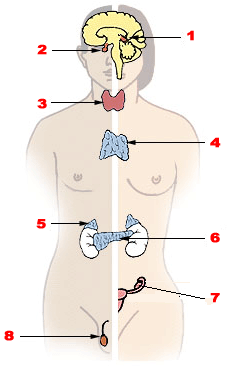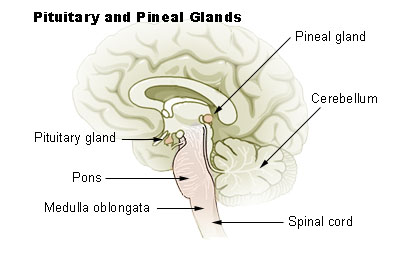The Endocrine System
Teacher Pages
The endocrine system is probably the least understood body system. Chemicals  secreted by the glands of this system have effects on numerous organs of multiple systems and control or regulate various mechanisms of every other body system.
secreted by the glands of this system have effects on numerous organs of multiple systems and control or regulate various mechanisms of every other body system.
The major endocrine glands: (Male, left, female, right)
1. Pineal gland
2. Pituitary gland
3. Thyroid gland
4. Thymus
5. Adrenal gland
6. Pancreas
7. Ovary
8. Testes
http://en.wikipedia.org/wiki/Endocrine_gland

http://en.wikipedia.org/wiki/Medulla_oblongata
Like the nervous system, the endocrine system is a system of control. But there are important differences. The nervous system is one of motor control; the endocrine system controls through chemicals. The nervous system is very fast-acting; when you sense a stimulus, it does not take you very long at all to react. The reaction is quick and short-lived. The endocrine system, however, responds much more slowly. The level of chemicals in the blood has to reach a certain threshold amount for the response to occur. Once the level of chemical in the blood has been achieved, the response occurs and is long-lasting. The response will continue until the level of the chemical decreases enough to stop the response. This mechanism is called the negative feedback mechanism because when the level decreases, the feedback stops the effects.
In contrast, other glands are exocrine glands because they secrete chemicals through ducts. For example, salivary glands secrete saliva and sweat glands secrete perspiration through tube-like ducts. Endocrine glands are ductless glands; they always secrete chemicals directly into the blood.
The endocrine system and its chemicals (hormones) help regulate many metabolic processes. Hormones control chemical reactions, help regulate water balance, growth, reproductive cycles, and digestive processes.
Endocrine glands secrete chemicals called hormones into the blood. Blood then transports the hormones to all parts of the body, but the hormone only has an affect on target cells. Target cells are specific to the hormone; a hormone specific to a target cell can only affect that target tissue because of the presence of receptors for the hormone on the target cells.
Some endocrine glands are so complex and so specific that certain sections of the gland produce different hormones. For example, the anterior lobe of the pituitary produces six different hormones that regulate vital body functions. The posterior lobe produces different hormones entirely—and the pituitary gland is about the size of a pea!
Most hormones are either steroids or amines, peptides, proteins, or glycoproteins synthesized from amino acids.
Hormones work to control body functions in three ways:
1) hormone to gland—For example, the hypothalamus secretes hormones that stimulate other endocrine glands to release hormones.
2) environmental condition to hormone —Some glands respond directly to changes in the body’s internal environment. For example, some glands respond directly to changes in the body’s chemical environment. When the blood glucose is elevated, the pancreas secretes insulin and when the blood glucose falls, it secretes glucagons.
3) nervous system to gland—Some glands secrete hormones in direct response to the nervous system. For example, the adrenal medulla secretes a hormone in response to sympathetic nerve impulses.
For information on specific endocrine glands, see the table on the following pages.
All body functions are influenced by the endocrine glands; there are no processes that are NOT affected by hormone signaling. Many functions are mediated by multiple hormones working together.
Check for understanding
1. Describe the general function of the endocrine system.
The endocrine system consisting of ductless glands secretes hormones directly into the blood that regulate body metabolism and body processes.
2. Compare and contrast the two control systems: the endocrine and the nervous system.
Both systems control body functions. The nervous system controls through motor responses. Responses are quick, and short-lived. The endocrine system controls through chemicals, and responses are slow and long-lasting.
3. Explain the negative feedback system of the endocrine system.
The level of chemicals in the blood has to reach a certain threshold amount for a hormonal response to occur. Once the level of chemical in the blood has been achieved, the response occurs and is long-lasting. The response will continue until the level of the chemical decreases enough to stop the response. This mechanism is called the negative feedback mechanism because when the level decreases, the feedback stops the effects.
4. Endocrine glands control many major body functions through hormones. List the endocrine gland involved in the metabolic processes described below:
a) increases size and division of body cells producing growth—pituitary gland
b) controls release of an egg—pituitary gland, ovary
c) helps control water balance in the body—adrenal glands
d) causes the kidneys to conserve water—adrenal glands, pituitary gland
e) increases blood pressure—adrenal gland
f) increases blood calcium concentration— parathyroid gland





